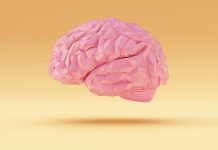
It’s long been believed that advancing age leads to broad declines in our mental abilities.
But in a new study from Georgetown University, researchers found surprisingly good news by countering this view.
They found that two key brain functions, which allow us to attend to new information and to focus on what’s important in a given situation, can in fact improve in older individuals.
These functions underlie critical aspects of cognition such as memory, decision making, and self-control, and even navigation, math, language, and reading.
The results indicate that critical elements of these abilities actually improve during aging, likely because people simply practice these skills throughout life.
In the study, the team looked at three separate components of attention and executive function in a group of 702 participants aged 58 to 98.
They focused on these ages since this is when cognition often changes the most during aging.
The components they studied are the brain networks involved in alerting, orienting, and executive inhibition. Each has different characteristics and relies on different brain areas and different neurochemicals and genes.
Alerting is characterized by a state of enhanced vigilance and preparedness in order to respond to incoming information. Orienting involves shifting brain resources to a particular location in space.
The executive network inhibits distracting or conflicting information, allowing us to focus on what’s important.
The team found that only alerting abilities declined with age. In contrast, both orienting and executive inhibition actually improved.
They hypothesize that because orienting and inhibition are simply skills that allow people to selectively attend to objects, these skills can improve with lifelong practice.
The gains from this practice can be large enough to outweigh the underlying neural declines, the team suggests.
In contrast, they believe that alerting declines because this basic state of vigilance and preparedness cannot improve with practice.
The team says the findings not only change the view of how aging affects the mind, but may also lead to clinical improvements, including for patients with aging disorders such as Alzheimer’s disease.
If you care about mental health, please read studies about inflammation strongly linked to mental sluggishness and findings of this muscle drug may affect cognitive ability in people with kidney diseases.
For more information about mental diseases, please see recent studies about this type of exercise may boost brain health, prevent cognitive decline and results showing two big risk factors for cognitive decline.
The study is published in Nature Human Behavior. One author of the study is Michael T. Ullman, Ph.D.
Copyright © 2021 Knowridge Science Report. All rights reserved.



